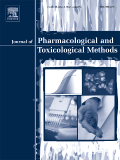
JOURNAL OF PHARMACOLOGICAL AND TOXICOLOGICAL METHODS
Scope & Guideline
Exploring the frontiers of drug safety and efficacy.
Introduction
Aims and Scopes
- Pharmacokinetics and Pharmacodynamics:
The journal extensively covers studies related to the pharmacokinetic profiles of drugs, including absorption, distribution, metabolism, and excretion (ADME). This includes innovative methodologies for assessing drug efficacy and safety in preclinical models. - Cardiovascular Safety Pharmacology:
A significant focus is placed on cardiovascular safety assessments, utilizing advanced techniques such as telemetry, electrocardiography, and human-induced pluripotent stem cell-derived cardiomyocyte assays to evaluate drug-induced cardiac effects. - Neurotoxicity and CNS Safety:
Research on the central nervous system (CNS) and neurotoxicity is a core area, with methodologies aimed at assessing drug effects on neuronal function and behavior, including in vitro models using human iPSC-derived neurons. - Toxicological Assessments:
The journal publishes findings on various toxicological assessments, including in vivo and in vitro studies evaluating drug safety, adverse effects, and mechanisms of toxicity, thereby providing insights into the safety profiles of pharmaceutical compounds. - Innovative Analytical Techniques:
There is a consistent emphasis on the development and validation of novel analytical techniques such as LC-MS/MS and in silico models, which enhance the reliability and accuracy of pharmacological and toxicological evaluations.
Trending and Emerging
- Human iPSC-Derived Models:
There is a marked increase in research utilizing human-induced pluripotent stem cell (iPSC)-derived models for drug testing, particularly in cardiotoxicity and neurotoxicity assessments, providing more relevant data for human applications. - In Silico Modeling and Computational Approaches:
The integration of in silico modeling techniques for predicting drug interactions and safety profiles is gaining traction, allowing for more efficient drug development processes and risk assessments. - Real-Time Data Monitoring Technologies:
Emerging trends include the use of advanced telemetry and real-time monitoring technologies that enhance the assessment of physiological responses in preclinical studies, improving the accuracy of safety evaluations. - Multi-Modal Drug Safety Assessments:
Research that combines various methodologies, such as electrophysiological assessments, biochemical markers, and imaging techniques, is on the rise, reflecting a holistic approach to drug safety and efficacy evaluations. - Regulatory Science and Best Practices:
There is a growing emphasis on regulatory science and the implementation of best practices in pharmacological testing, aligning research with evolving regulatory frameworks and guidelines to ensure drug safety.
Declining or Waning
- Traditional Toxicology Testing Methods:
There is a noticeable decline in studies utilizing traditional toxicology testing methods, as the field moves towards more innovative and predictive models, particularly those integrating human iPSC technology. - Single Species Animal Models:
Research using single species animal models for pharmacological testing is waning, with a shift towards more complex models that better mimic human physiology and disease states. - Basic Pharmacological Studies:
Basic pharmacological studies that do not incorporate advanced methodologies or translational relevance are less frequently published, reflecting a trend towards more applied and clinically relevant research. - Invasive Procedures in Animal Testing:
There is a gradual decline in the use of invasive procedures for drug testing, as ethical considerations and regulatory changes promote the adoption of non-invasive and reduced-refinement approaches.
Similar Journals
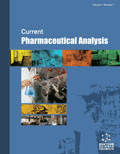
Current Pharmaceutical Analysis
Fostering Collaboration in Pharmaceutical InnovationCurrent Pharmaceutical Analysis, published by Bentham Science Publishers Ltd, is a vital resource for professionals and researchers in the fields of Pharmaceutical Science, Biochemistry, and Molecular Medicine. Established in 2006, this peer-reviewed journal aims to provide a platform for the latest advancements and analytical methodologies in pharmaceutical research and drug development. Over the years, it has garnered attention for its rigorous scrutiny and contributions to the landscape of pharmacology, evidenced by its quartile placements in various categories, most notably Q3 in Pharmaceutical Science. Despite its current rankings placing it in the lower quartile in several disciplines, the journal remains an essential venue for both emerging and established researchers seeking to disseminate their findings. With the widespread accessibility of its articles, researchers, professionals, and students can engage with cutting-edge studies to foster innovation in pharmaceutical analysis. For access to the latest research contributions, readers can explore the digital archive and stay updated on pivotal discussions shaping the future of the pharmaceutical sciences.
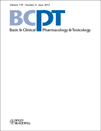
BASIC & CLINICAL PHARMACOLOGY & TOXICOLOGY
Advancing Knowledge at the Intersection of Medicine and ToxicologyBASIC & CLINICAL PHARMACOLOGY & TOXICOLOGY, published by WILEY, serves as a vital resource in the fields of medicine, pharmacology, and toxicology. With an ISSN of 1742-7835 and E-ISSN 1742-7843, this journal has established a robust reputation, reflected in its Q2 classification across its categories in 2023. It aims to disseminate high-quality research and reviews that bridge the gap between basic scientific findings and clinical applications. Operating from the United States with an address at 111 RIVER ST, HOBOKEN 07030-5774, NJ, this journal focuses on the intersection of drug action and toxicity, making it an essential platform for researchers, healthcare professionals, and students. With a converged publication timeline from 2004 to 2024, BASIC & CLINICAL PHARMACOLOGY & TOXICOLOGY continues to make significant contributions to understanding pharmacological treatments and toxicological challenges. Open access options are available to broaden the reach and impact of its published work.
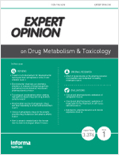
Expert Opinion on Drug Metabolism & Toxicology
Innovative Perspectives on Drug Metabolism and ToxicologyExpert Opinion on Drug Metabolism & Toxicology, published by Taylor & Francis Ltd, is a leading journal in the fields of pharmacology and toxicology, with a distinguished reputation gleaned from its Q1 rankings in both disciplines as of 2023. With an ISSN of 1742-5255 and an E-ISSN of 1744-7607, this journal aims to foster innovative discussions and critical insights into the metabolism and toxicological assessment of drugs, appealing to a wide audience of researchers, professionals, and students. The journal's commitment to maintaining high academic standards is reflected in its placement within the top quartiles of the Scopus rankings—ranked 17th in Toxicology and 73rd in Pharmacology—demonstrating its significant impact and relevance in advancing knowledge within the drug development sector. Published since 2005 and converging into 2024, it provides a platform for timely dissemination of expert opinions, systematic reviews, and original research, reinforcing its vital role in shaping the future of pharmacological sciences in an ever-evolving landscape.
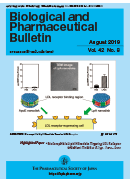
BIOLOGICAL & PHARMACEUTICAL BULLETIN
Bridging the Gap Between Science and HealthcareBIOLOGICAL & PHARMACEUTICAL BULLETIN, published by the PHARMACEUTICAL SOC JAPAN, is a prominent peer-reviewed journal that serves the fields of medicine, pharmaceutical science, and pharmacology. With an ISSN of 0918-6158 and an E-ISSN of 1347-5215, this publication has been crucial in disseminating innovative research since its inception in 1993, and it continues to contribute significantly to the body of knowledge as it converges towards 2024. Despite being classified as a non-open access journal, it maintains a respectable Q3 ranking in Medicine (miscellaneous) and Q2 in Pharmaceutical Science, highlighting its critical role in advancing scientific discourse in these areas. With Scopus rankings placing it in the 51st percentile for Pharmaceutical Science and 38th percentile for Pharmacology, BIOLOGICAL & PHARMACEUTICAL BULLETIN is an essential resource for researchers, professionals, and students looking to stay abreast of cutting-edge developments and trends in biomedicine and drug development.

Toxicological Research
Exploring the intricate relationship between substances and health.Toxicological Research is a prominent academic journal dedicated to advancing the field of toxicology through rigorous exploration and innovative research. Published by the Korean Society of Toxicology, this journal serves as a vital resource for researchers, professionals, and students engaged in environmental science, pharmacology, and toxicology. With an ISSN of 1976-8257 and an E-ISSN of 2234-2753, Toxicological Research highlights significant findings and discussions in the realm of health, toxicology, and mutagenesis. Although not an open-access journal, it maintains a solid reputation as evidenced by its Q3 ranking in both health-related toxicology and general toxicology categories for 2023. The journal covers a broad spectrum of topics from fundamental research to applied toxicology and provides a unique platform for the dissemination of knowledge in a field that is increasingly relevant in today’s society. With an anticipated convergence period from 2008 to 2024, Toxicological Research continues to contribute vital insights to understanding the implications of toxic substances on health and the environment.
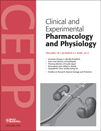
CLINICAL AND EXPERIMENTAL PHARMACOLOGY AND PHYSIOLOGY
Exploring Innovative Research for Clinical ExcellenceCLINICAL AND EXPERIMENTAL PHARMACOLOGY AND PHYSIOLOGY, published by WILEY, is a premier journal that serves as a vital resource for researchers, professionals, and students in the fields of pharmacology and physiology. With ISSN 0305-1870 and E-ISSN 1440-1681, this journal has established itself as a significant contributor to scientific dialogue since its inception in 1974. Currently spanning until 2024, it consistently publishes cutting-edge research addressing both experimental and clinical advancements in pharmacology and physiology. Recognized for its quality, it holds a Q2 ranking in the 2023 Pharmacology category and notable Q3 rankings in both Physiology and Medical Physiology. The journal's coverage of topical issues not only ensures a robust platform for innovative findings but also fosters collaborations across disciplines. Although not an Open Access journal, its curated content is invaluable for advancing knowledge, as evidenced by its solid Scopus rankings, which place it within the top percentiles of its field. Engaging with this journal means staying at the forefront of research that shapes clinical practices and experimental methodologies.

NAUNYN-SCHMIEDEBERGS ARCHIVES OF PHARMACOLOGY
Championing Excellence in Pharmacological ResearchNAUNYN-SCHMIEDEBERGS ARCHIVES OF PHARMACOLOGY is a prestigious journal published by SPRINGER, focusing on the dynamic fields of pharmacology and toxicology. With an ISSN of 0028-1298 and an E-ISSN of 1432-1912, this esteemed publication has been a staple in the scientific community since its inception in 1969, continuing to wield influence with a convergence of research that reaches through 2024. Ranked in the Q2 category for both medicine and pharmacology, it stands at an impressive 111th out of 313 in the Scopus rankings for pharmacology, reflecting its significant impact in the field. Though not offering open access, the journal remains a vital resource for researchers, professionals, and students seeking to explore groundbreaking studies and advancements in pharmacological science. With its high standards and comprehensive coverage, NAUNYN-SCHMIEDEBERGS ARCHIVES OF PHARMACOLOGY is essential reading for those dedicated to understanding the mechanisms of drug action and the complexities of therapeutic interventions.
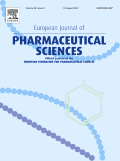
EUROPEAN JOURNAL OF PHARMACEUTICAL SCIENCES
Empowering Researchers to Transform Pharmaceutical PracticesThe European Journal of Pharmaceutical Sciences is a prestigious academic journal dedicated to advancing the field of pharmaceutical science. Published by Elsevier, the journal boasts an impressive impact factor and is categorized in the Q1 quartile for pharmaceutical science as of 2023, signifying its influence and reputation within the academic community. With a Scopus ranking of #20 out of 183 in the fields of pharmacology, toxicology, and pharmaceutics, the journal provides a vital platform for researchers and practitioners to disseminate innovative studies and groundbreaking research that push the boundaries of drug development and delivery. Based in the Netherlands and operating since 1993, the journal seeks to cover a broad scope of topics related to pharmaceutical sciences, encouraging rigorous evaluations and discussions that enhance the understanding and application of this critical field. The absence of open access underscores the commitment to maintaining high scholarly standards, while still offering avenues for libraries and institutions to provide access to cutting-edge research. As the journal converges towards its 2024 milestones, it continuously aims to foster a vibrant exchange of knowledge among its diverse readership, comprising committed researchers, professionals, and students.

DARU-Journal of Pharmaceutical Sciences
Innovating drug discovery through rigorous research.DARU-Journal of Pharmaceutical Sciences is a leading peer-reviewed journal published by SPRINGER INT PUBL AG that focuses on the dynamic and rapidly evolving fields of pharmaceutical sciences, including drug discovery, pharmacology, and toxicology. With an impressive Q2 ranking in both Drug Discovery and Miscellaneous Medicine categories for 2023, this journal stands out as a vital resource for researchers, professionals, and students alike, offering a platform for significant contributions to the scientific community. Covering a comprehensive scope from 2000 to 2024 and indexed by Scopus, the journal ranks within the top percentile in its field, with a ranking of #66/313 in Pharmacology and #34/157 in Drug Discovery, reaffirming its impact and relevance. The journal promotes open access to foster widespread dissemination of knowledge in pharmaceutical sciences, ultimately aiming to bridge the gap between research and clinical applications. For those looking to stay at the forefront of pharmaceutical innovation, DARU represents an invaluable connection to the latest studies and breakthrough findings.

International Journal of Pharmacology
Bridging Research and Application in PharmacologyWelcome to the International Journal of Pharmacology, a key publication in the field of pharmacology, published by ASIAN NETWORK SCIENTIFIC INFORMATION (ANSINET). Since its inception in 2006, this journal has provided a vital platform for researchers and professionals to disseminate their findings and insights in pharmacology, toxicology, and pharmaceutics. Despite recent discontinuation in Scopus coverage, the journal's dedication to fostering scientific dialogue continues to attract contributions from esteemed scholars globally. With an **ISSN of 1811-7775** and **E-ISSN of 1812-5700**, the journal seeks to bridge the gap between laboratory research and clinical application, promoting a deeper understanding of drug actions and interactions. Although it operates under traditional access options, the relevance of its published studies to ongoing pharmacological research remains significant.